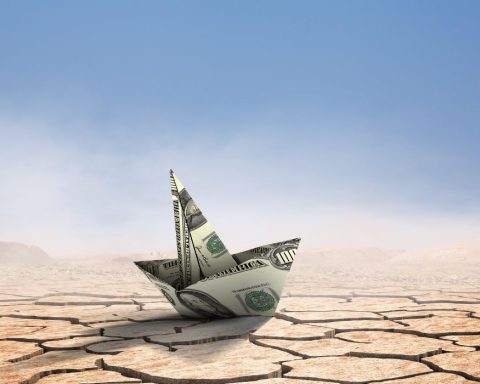There’s something about getting stranded on a remote island that brings things into focus – and in the case of an October kayaking trip, points the way to getting to a net-zero economy on time.
It was a sunny Saturday, and my co-adventurer and I had paddled through the shimmering waters of Georgian Bay and landed on the distant Beckwith Island, home to beautiful sand beaches on Lake Huron. I had glanced at the weather, noting that a lightning storm was expected to roll in the next day (which we had planned to avoid), but I neglected to check the prevailing wind currents.
Around 4 a.m., I awoke to 50-kilometre-per-hour winds battering the tent and quickly pulled up the wind charts on my trusty BlackBerry. To my dismay, the high winds would hold steady for the next 48 hours.
This was a bit of a problem. I needed to be back in Toronto to present our latest sustainable investment research to attendees at a summit hosted by the Principles for Responsible Investment, whose signatories manage US$121 trillion in assets.
We tried calling a water taxi, but none were seaworthy in the high winds. So we called members of the Beausoleil First Nation, on whose territory we were trespassing (albeit lightly and with great awe). Sue, who runs the Bayshore Variety, Video & Restaurant on Christian Island, answered the phone and said to give her 10 minutes. Constable Elijah from the Anishinabek Police Service quickly called me back. I confessed our trespasses, but her focus was getting us to safety. A half hour later, a large sturdy Ontario Provincial Police ship motored into the bay to ferry us back to the mainland.
It hit home that we are all in this together, and the human instinct when someone is in harm’s way is to help.
We are all in harm’s way when it comes to the floods, fires and sweltering heat brought by extreme climate change. People, governments and businesses are doing more than we tend to appreciate to get us out of this climate conundrum – which is why more than twice as much clean energy was added to the global mix the past few years compared to conventional energy.
But it isn’t fast enough.
Just like I got distracted by the lightning storm and failed to take note of the prevailing wind patterns, as a society we pay too much attention to the storms and flashes of the political economy, unaware of the prevailing winds of the real economy.
Let’s be clear here: the sustainable clean energy economy is experiencing exponential growth. It is going parabolic because most clean technology options are superior and only getting better.
Corporate Knights data shows that for the large companies that make up 80% of global market capitalization, sustainable revenues and capital expenditures are growing more than twice as fast as everything else over the past five years. This trend holds across sectors and regions and puts the sustainable economy on a path to dominate the global economy by the end of the next decade.
People bay at the moon for political leadership, but it didn’t seem to matter who was president of the United States the past eight years when it comes to this sector. Oil and gas continued to rise under both administrations, yes, but there was no stopping the clean economy, regardless of rhetoric at the top. Clean energy investment surged under Trump and Biden, comprising the bulk of all energy investment under both guys in each of their last years in office, according to data from Clean Investment Monitor and the International Energy Agency’s World Energy Investment.
While the die is cast on the direction of travel of our global economy, we can speed it up.
Rather than climate transition plans, we need economic transition plans focused on the high-growth areas of our economy – and the climate solutions (the highest-growth part of the economy) will come along for the ride. The main business association in Europe (BusinessEurope) recently embraced this logic, as did the Business Council of Australia a few years ago.
These business associations have critical roles to play in setting the parameters for what is seen as politically possible, and both the U.S. and Canada would do well to get on board.
Roughly 150 countries have set a goal for net-zero, and this target is now backed by financial players representing $150 trillion in combined assets (a 30-fold increase over the past four years). Paraphrasing former governor of the Bank of Canada Mark Carney, when society sets a clear goal and technology makes it possible, it becomes increasingly profitable to become part of the solution and increasingly costly to be part of the problem.
That’s where we are right now. If we want to deploy these climate solutions to power and move our economies, there are some basic things we need to do.
Number one: stop gridlocking renewable-energy potential by updating energy-regulator mandates to focus on rapid permitting and shortening the grid-connection queue. According to the IEA, 1,650 gigawatts (more than double the 666 GW added this year) of clean energy capacity in advanced development stages is waiting for grid connections.
Number two: stop allowing incumbents from the fossil fuel sector (including those with vested interest in dragging out the decline of the internal combustion engine economy) to weaponize our fears about losing jobs (subsidized to the tune of $10 million per job) to China, delaying inevitable balance-sheet write-downs. It does not serve our interest to make trade in low-carbon goods and services a political football.
Number three: start spending more public money now. While the private sector will provide the dominant supply of capital in the latter half of the race to net-zero by 2050, publicly sourced money will be necessary to close the climate investment gap (which sits around 5% of GDP) between now and 2030.
With technology on our side, staying in touch with the prevailing economic winds, and the public purse to help us through choppy waters, blue skies are ahead.
Toby Heaps is co-founder and publisher of Corporate Knights.







